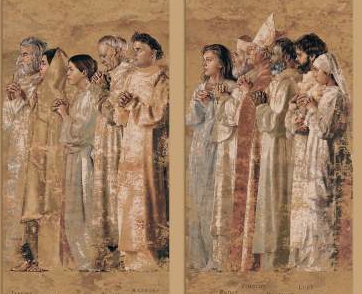 When we give someone a gift at Christmas, or at a birthday party or anniversary event, we call it a present. Why? Because you are close to that person, that friend, that loved one. Your presence is contained within your gift, your present.
When we give someone a gift at Christmas, or at a birthday party or anniversary event, we call it a present. Why? Because you are close to that person, that friend, that loved one. Your presence is contained within your gift, your present.
When you twitter someone with a tweet, or e-mail that person, you are present to them. When you send someone a hand-written letter you are more personally present than you are when you tweet them. I suppose that’s because sending a letter in your own handwriting requires more effort than reaching you friend or loved one with a few electronic bytes. Isn’t a handwritten letter more personal than an electronic note?
Also, there are types of closeness. Think, for instance, of the differences between shaking hands, holding hands, and kissing someone. The qualities of closeness and of presence differ. The more personal the presence the better is our relationship with another. Enjoying the presence of another, enjoying the presence of someone we want to be our friend, or someone we want to love us is one of the greatest treasures of our lives.
But presence involves listening. Do you listen with just your ears or do you listen and hear with your heart? When you are listening to someone with your heart you are paying them deep attention. The quality of your presence is higher when you are more empathetic than simply sympathetic. Hearts speak to hearts and that is particularly so when it comes to you and God.
All of which leads me to turn our attention now to asking the question: How is God present to you? How do you expect God to be present to you? Do you expect God to be present to you by actually believing that He cares for you, that He loves you and wants to be with you? Do we pray our prayers with our words, or do we pray our prayers personally with our hearts? It’s one thing to recite prayers, it’s quite another to pray with our hearts, to pray in the presence of God while conscious of the fact that He cares.
The big problem you and I face in the world we live in today is that our lives are filled with busyness, things, and clutter amidst a lot of noise. Since that is so, where do you look for God… where do you expect to be aware of His presence with you and His love for you? The world around us does not care very much about God, if at all. In fact there are many voices that tell to keep God out of our lives. Paying attention to God is not in favor these days and yet God is present to the souls He has created even though they don’t realize it.
The scripture passages for the Eighth Sunday in Ordinary Time (Is 49:14-15; 1 Cor 4:1-5; Mt 6:24-34) are all about the proposition that God loves you with a love beyond anything that you can comprehend. He loves you with an everlasting love that knows no limits. He loves you with a love so deep that you will never understand it.
You might ask, “How do we know that?” Take some time to gaze at a crucifix and you will have your answer. Moreover, God is present to you in a Holy Communion that you will never fully comprehend. The scripture readings provoke another question: What kind of God is God? Who among us has not searched for the answer to that question? What do we expect God to do for us? As revealing as the answer may be, a related question arises: What does God expect of us? More often than not we don’t want to even begin to answer that one. Nevertheless in moments when we do take time to reflect on life’s bigger questions we ought to face it. Where do we place our trust — in God or in material comforts and success? To what or to whom do I give my heart? Jesus who well knows the human heart and He clearly warns us that where our treasure is, there we will know what is in our hearts.
If, however, we wish to have a relationship with God then we must address the fundamental questions in all human relationships: What do we look for in each other and what do we expect of each other?
The danger to our hearts and to our eternal life with God in heaven lies in our ensnarement in the values of this world –power, wealth, fame, pleasures, and the glitter of this world’s treasures, treasures that are by no means safe and secure in our hands. Setting our hearts on them means that we are not setting our hearts on what is truly lasting and of great value. Setting our hearts on them means that we give scant attention to God’s love for us, a love which God expresses in the first reading (Is 49:14-15), “Can a mother forget her infant, be without tenderness for the child of her womb? Even if she should forget, I will never forget you.”
These words were taken from the Old Testament’s book of the prophet Isaiah. He spoke them to his Hebrew people as God delivered them from their captivity in Babylon and they were about to return to their homeland of Israel. They were words of consolation, words speaking of God’s love for His people. He was always close to them; He always loved them. Now He was delivering them from their pain and suffering. Shout for joy, you heavens; earth, exult! Mountains, break into joyful cries! For Yahweh has consoled his people, is taking pity on his afflicted ones. Zion was saying, ‘Yahweh has abandoned me, the Lord has forgotten me.’ [But] can a woman forget her baby at the breast, feel no pity for the child she has borne? Even if these were to forget, I shall not forget you.
Similarly the words of Jesus in today’s Gospel (Mt 6:24-34) account speak of God’s love for us and of His desire to free us from all that holds us captive and keeps us apart from Him. God is always present to us waiting for us to be with Him. How have we in turn been present to Him? There are some clear answers we can have.
We can spend some quality time alone with God reflecting on what has happened in our lives and where we have experienced His love. Times of just being with Him are times of deep, intimate prayer.
Many parishes have Chapels of Adoration, places where we can go and spend quiet time alone with God in the Blessed Sacrament.
Reading sacred scripture is another way of enjoying God’s presence and giving Him your presence in return. I’m not speaking of simply reading bible passages. I’m speaking of absorbing what they inspire within you, absorbing what God’s Word has to say to you.
When we give someone a gift at Christmas, or at a birthday party or anniversary, we call it a present. Why? Because you are close to that person, that friend, or that loved one. Your presence is contained within your present to him or her. Why not give God a present some day soon… quality time alone with Him? After all, hearts speak to hearts.








